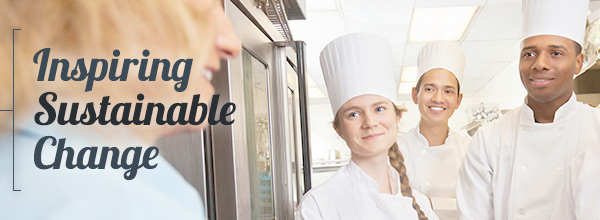Food Efficiency: Inspiring Sustainable Change in Commercial Kitchens

We all know employees are critical to our success, influencing perceptions of our brand, controlling the quality of our food and defining the overall guest experience. But often operators struggle with staff engagement, finding it difficult to get people to tune in. This isn’t just unfortunate, it’s dangerous.
How can we combat this? Beyond proven management approaches (carrots and sticks) we have an opportunity to leverage tools from social psychology (the scientific study of how people's behaviors are influenced by the presence of others). At LeanPath, we’ve used these tools to engage front-line staff in food waste prevention activities. While this is a very specific context, the principles apply broadly across an operation to drive higher levels of engagement. How?
Provide vivid feedback loops to staff.
People react to and remember information that paints a vivid visual picture in their mind. For example, it’s a bit dull to say we “avoided 60 tons of food waste last year” but much more interesting to say “if you added up all the food we avoided wasting last year, it would weigh the same as 20 Asian Elephants.” The same holds true with environmental progress and resource efficiency: “last month we reduced food waste by 27% which is the same as saving 2,500 bathtubs of fresh water.” (LeanPath systems calculate examples like these in real time and share them with staff.)
Encourage small commitments (which often lead to bigger changes).
There was a study conducted decades ago where researchers asked a group of homeowners if they would display a small sign in their window encouraging others to drive safely. Later, the researchers returned to the group that had said ‘yes’ to that smaller request and asked if they would display a billboard-sized sign in their front yard containing a similar message. They also asked a control group which had not been asked about the smaller sign to place the larger sign. The results: 76% of those who made the small commitment also said ‘yes’ to this big request while no one in the control group agreed to do it.
This illustrates the fact that people feel a strong need to maintain actions consistent with the external commitments they have made. We can leverage this by asking staff to make a small commitment and then later asking for more engagement with an issue. For example, encourage team members to make a small commitment by pledging to reduce food waste at home this week. Return later with a bigger request related to consistent food waste efforts at work.
Use randomized incentives.
‘Gamification’ is a buzz word that we’ve talked about in the past and it’s been a proven tool in engaging employees in many industries. At LeanPath, we’ve integrated it into our systems and many of our clients have told us how much their employees love our ‘instant win’ feature. Similar to a slot machine, staff members never know when they might win while recording a food waste transaction. As a result, it makes them want to participate in the food waste prevention program consistently. Keeping things fun and unexpected can encourage long term engagement.
Create friendly competition.
Many of us are competitive by nature, and creating competitions amongst team can be a powerful motivational tool. At LeanPath, we’ve created league tables that our clients can use to showcase to front-line teams the top participants helping to reduce waste, as well as showing team members who haven’t recorded any waste this week below a gray line in the league, providing a gentle nudge to encourage them to participate.
Recognize individuals in front of the team.
Public recognition can go a long way toward cementing someone’s commitment. Highlight a top achiever in front of peers for specific good work, and they will work that much harder to maintain that standard over time.
These are just a few examples, applied to food waste prevention, but you can use similar strategies to get deeper engagement and buy-in throughout your operation. That said, we’ve found that food waste is a uniquely great topic through which to engage your team initially. Most employees dislike food waste and enjoy the chance to work on the problem. Once engaged in the topic, their food waste reduction actions quickly connect them back to other important behaviors in the kitchen linked to quality, food safety, sanitation, good planning and communication.
How are you motivating sustainable behavior change in your kitchen? Share your story with the LeanPath community! Email us at info@leanpath.com or leave your answer in the comments below.
